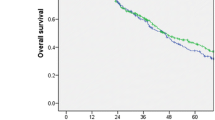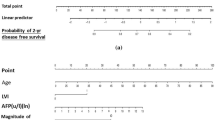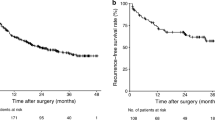Abstract
Background
Repeat hepatectomy (re-hepatectomy) is an effective treatment for patients with intrahepatic recurrence following liver resection for hepatocellular carcinoma (HCC).
Objective
This study aimed to develop nomograms for predicting prognosis after re-hepatectomy.
Methods
The data of 635 patients who underwent re-hepatectomy for recurrent HCC at the Eastern Hepatobiliary Surgery Hospital between 2004 and 2010 were prospectively collected. Multivariable Cox regression analyses based on data obtained before and after re-hepatectomy were performed to select independent predictors of recurrence to death survival (RTDS) which were incorporated into the pre- or post-re-hepatectomy nomograms. Discrimination and calibration of the nomograms were measured using the concordance index (C-index), Kaplan–Meier curves, and calibration plots.
Results
The 1-, 3- and 5-year overall survival rates were 96.9, 74.8, and 47.8 %, respectively, and the corresponding RTDS rates were 75.8, 45.7, and 37.6 %, respectively. Tumor size and number at the initial and recurrent stages, time to recurrence from the initial hepatectomy, hepatitis B virus deoxyribonucleic acid level and microvascular invasion were selected into the two nomograms. The C-indexes for predicting RTDS were 0.72 [95 % confidence interval (CI) 0.70–0.74] and 0.77 (95 % CI 0.74–0.80) for the pre- or post-re-hepatectomy nomograms, respectively. The calibration curves for the probability of 5-year RTDS after re-hepatectomy showed optimal agreement between the prediction shown in the nomograms and the actual observations. Both nomograms were able to accurately stratify patients into four distinct incremental prognostic subgroups.
Conclusion
The proposed nomograms have shown accurate RTDS prediction for patients with intrahepatic recurrent HCC.



Similar content being viewed by others
References
Siegel R, Ma J, Zou Z, Jemal A. Cancer statistics, 2014. CA Cancer J Clin. 2014;64:9–29.
Bruix J, Sherman M; American Association for the Study of Liver Diseases. Management of hepatocellular carcinoma: an update. Hepatology. 2011;53:1020–1022.
Sugimachi K, Maehara S, Tanaka S, Shimada M, Sugimachi K. Repeat hepatectomy is the most useful treatment for recurrent hepatocellular carcinoma. J Hepatobiliary Pancreat Surg. 2001;8:410–416.
Yoshizumi T, Ikegami T, Yoshiya S, et al. Impact of tumor size, number of tumors and neutrophil-to-lymphocyte ratio in liver transplantation for recurrent hepatocellular carcinoma. Hepatol Res. 2013;43:709–716.
Ho CM, Lee PH, Shau WY, Ho MC, Wu YM, Hu RH. Survival in patients with recurrent hepatocellular carcinoma after primary hepatectomy: comparative effectiveness of treatment modalities. Surgery. 2012;151:700–709.
Matsuda M, Fujii H, Kono H, Matsumoto Y. Surgical treatment of recurrent hepatocellular carcinoma based on the mode of recurrence: repeat hepatic resection or ablation are good choices for patients with recurrent multicentric cancer. J Hepatobiliary Pancreat Surg. 2001;8:353–359.
Poon RT, Fan ST, Lo CM, Liu CL, Wong J. Intrahepatic recurrence after curative resection of hepatocellular carcinoma: long-term results of treatment and prognostic factors. Ann Surg. 1999;229:216–222.
Huang ZY, Liang BY, Xiong M, et al. Long-term outcomes of repeat hepatic resection in patients with recurrent hepatocellular carcinoma and analysis of recurrent types and their prognosis: a single-center experience in China. Ann Surg Oncol. 2012;19:2515–2525.
Tsujita E, Yamashita Y, Takeishi K, et al. Poor prognostic factors after repeat hepatectomy for recurrent hepatocellular carcinoma in the modern era. Am Surg. 2012;78:419–425.
de Lope CR, Tremosini S, Forner A, Reig M, Bruix J. Management of HCC. J Hepatol. 2012;56 Suppl 1:S75–S87.
Wang K, Liu J, Yan ZL, et al. Overexpression of aspartyl-(asparaginyl)-beta-hydroxylase in hepatocellular carcinoma is associated with worse surgical outcome. Hepatology. 2010;52:164–173.
Wong TC, Lo CM. Resection strategies for hepatocellular carcinoma. Semin Liver Dis. 2013;33:273–281.
Dindo D, Demartines N, Clavien PA. Classification of surgical complications: a new proposal with evaluation in a cohort of 6336 patients and results of a survey. Ann Surg. 2004;240:205–213.
Edmondson HA, Steiner PE. Primary carcinoma of the liver: a study of 100 cases among 48,900 necropsies. Cancer. 1954;7:462–503.
Lim KC, Chow PK, Allen JC, et al. Microvascular invasion is a better predictor of tumor recurrence and overall survival following surgical resection for hepatocellular carcinoma compared to the Milan criteria. Ann Surg. 2011;254:108–113.
Qu LS, Jin F, Huang XW, Shen XZ. High hepatitis B viral load predicts recurrence of small hepatocellular carcinoma after curative resection. J Gastrointest Surg. 2010;14:1111–1120.
Mathews P, Lee D, Chung YH, et al. Effects of genomic changes in hepatitis B virus on postoperative recurrence and survival in patients with hepatocellular carcinoma. Ann Surg Oncol. 2013;20:1216–1222.
Bayliss J, Lim L, Thompson AJ, Desmond P, Angus P, Locarnini S, et al. Hepatitis B virus splicing is enhanced prior to development of hepatocellular carcinoma. J Hepatol. 2013;59:1022–1028.
Yang P, Li QJ, Feng Y, et al. TGF-beta-miR-34a-CCL22 signaling-induced Treg cell recruitment promotes venous metastases of HBV-positive hepatocellular carcinoma. Cancer Cell. 2012;22:291-303.
Funding
This study was supported by the State Key Project on Infectious Diseases of China (2012ZX10002–016, to Feng Shen), Shanghai Municipal Science and Technology Project (12431900803, to Feng Shen), and the Natural Science Foundation and Medical Development of Shanghai (12ZR1439700, 134119a7100, to Jun Li).
Disclosure
No potential conflicts of interest were disclosed.
Author information
Authors and Affiliations
Corresponding author
Additional information
Qifei Zou and Jun Li have been contributed equally in this work.
Electronic supplementary material
Below is the link to the electronic supplementary material.
Rights and permissions
About this article
Cite this article
Zou, Q., Li, J., Wu, D. et al. Nomograms for Pre-operative and Post-operative Prediction of Long-Term Survival of Patients Who Underwent Repeat Hepatectomy for Recurrent Hepatocellular Carcinoma. Ann Surg Oncol 23, 2618–2626 (2016). https://doi.org/10.1245/s10434-016-5136-0
Received:
Published:
Issue Date:
DOI: https://doi.org/10.1245/s10434-016-5136-0




